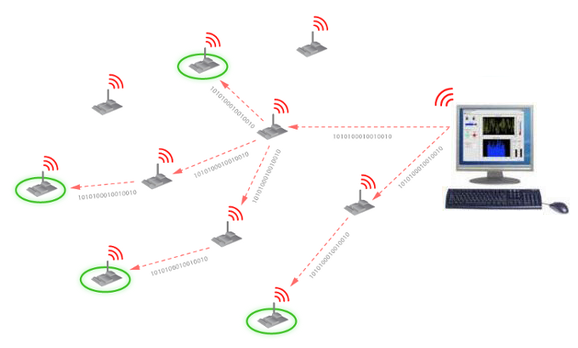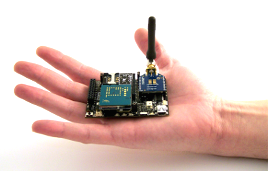
Wireless Sensor Network
A wireless sensor network (WSN) consists of spatially distributed autonomous sensors to monitor physical or environmental conditions, such as temperature, sound, pressure, etc. and to cooperatively pass their data through the network to a main location.
The more modern networks are bi-directional, also enabling control of sensor activity. The development of wireless sensor networks was motivated by military applications such as
battlefield surveillance
They are now used in many industrial and consumer applications, such as industrial process monitoring and control, machine health monitoring, environment and habitat monitoring, healthcare applications, home automation, traffic control and so on.
Wireless sensor networks consists of a large number of small computers, sensor nodes,
like the one shown below that can sense its environment, compute, store information and communicate wirelessly. In general, it is not known beforehand where a node is going
to end up so the nodes set up an ad hoc network among themselves when they are deployed.

Wireless Sensor Node
Advantages of Wireless Sensors
- Much cheaper to deploy than wired sensors
- Sensor nodes can be added or removed easily
- Node location can be changed without rewiring
- Can be configured into different network topologies. Star, Mesh, etc
Data Visualization
At the base station, the incoming live streaming data can be displayed on a computer, stored in a database, and plotted on a web page for near-real-time viewing and analysis.
[ Uses for Wireless Sensor Network ]
Applications for Gas Sensors:-
- City pollution
- Emissions from farms and hatcheries
- Control of chemical and industrial processes
- Forest fires
Applications for Events Sensors:-
- Security: Perimeter monitoring
- Emergencies: Presence detection and water level sensors, temperature
- Control of goods in logistics: Vibration and impact sensors
Applications for Smart Cities Sensors:-
- Noise maps: Monitor in real time the acoustic levels in the streets of a city
- Structural health monitoring: Crack detection and propagation
- Air quality: Detect the level of particulates and dust in the air
- Waste management: Measure the garbage levels in bins to optimize the trash collection routes
Applications for Smart Parking Sensors:-
- Car detection for available parking information
- Detection of free parking lots outdoors
- Parallel and perpendicular parking lots control
Applications for Agriculture Sensors:-
- Irrigation Systems: Soil moisture, leaf wetness
- Greenhouses: Solar radiation, humidity, temperature
- Weather Stations: Anemometer, wind vane
Applications for Smart Metering Sensors:-
- Energy measurement
- Water consumption
- Pipe leakage detection
- Liquid storage management
- Tanks and silos level control
- Supplies control in manufacturing
- Industrial Automation
- Agricultural Irrigation
Other Applications:-
- Human Fall Detection
- Motion, Tilt and Slope measurement
- Unmanned Air Vehicle PositioningPipe leakage detection
- Shock and Vibration measurementLiquid storage management
Our services include turnkey solution from sourcing, design, development and deployment of wireless sensor network according to customer's application requirement.
Call us today to get an evaluation of your wireless sensor application needs.
Please email [email protected] or call 65-6552-2248 for more information.
|

